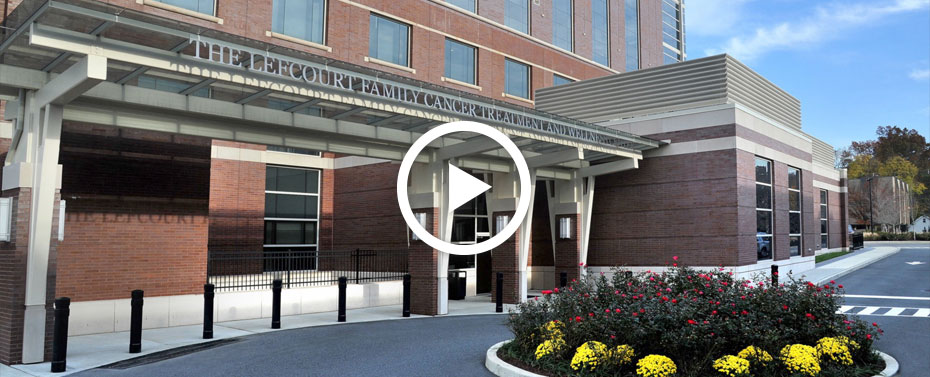Cancer Care
If you’re facing a cancer diagnosis, where do you turn? The Lefcourt Family Cancer Treatment and Wellness Center at Englewood Health offers comprehensive cancer care, from advanced screening to survivorship programs. We’re with you throughout your cancer journey, planning personalized care to ensure the most successful outcomes possible for you.
Our cancer center provides subspecialized, fellowship-trained experts who are only taking care of patients with that particular cancer. Their specialized skills in providing surgery or radiation or chemotherapy help achieve the best possible outcome for the patient.
Dr. Steven Brower, Medical Director, The Lefcourt Family Cancer Treatment and Wellness Center
New Patients: Making an Appointment
If you have been recently diagnosed with cancer and are looking for care or a second opinion, we are here to help. You can contact us online through our secure form and someone will get back to you. Or call us directly at 201-608-2266.
Why Choose Englewood Health for Cancer Care?
The oncology experts at The Lefcourt Family Cancer Treatment and Wellness Center have extensive experience diagnosing and treating all major forms of cancer.
Our Cancer Team Approach
We’ve created disease-specific teams made up of different types of doctors specializing in your cancer, including:
- Pathologists who use advanced technologies—such as next-generation tumor sequencing, target-gene analysis, and liquid biopsy—to help identify unique features of your specific type of cancer
- Radiologists who use advanced imaging techniques, including CT, MRI, ultrasound, and PET scan, to detect cancer and monitor treatment progress
- Surgeons skilled in tumor removal and preservation of healthy tissues
- Oncologists who help diagnose your condition and develop a plan for dealing with cancer, including managing your chemotherapy treatment
- Other doctors who specialize in the specific area of the body needing treatment
- Radiation oncologists who deliver precise radiation therapy
Your care team also includes a patient navigator and specialists in nutrition, pain and palliative medicine, integrative medicine, genetic counseling, and other supportive services.
Together, these experts review all patient cases to make recommendations for treatment and develop an individualized plan. Treatments may include minimally invasive surgery, chemotherapy, radiation, and participating in clinical trials.
Cancer Support Services
A cancer diagnosis may make you feel frightened and alone. At The Lefcourt Family Cancer Treatment and Wellness Center, we provide a range of support services to make your treatment a little easier, including:
Englewood Health Awards and Recognition for Cancer Care
We work hard to help all people stay as healthy as possible throughout cancer treatment. Englewood Health is nationally known for achieving the highest standards of excellence in cancer diagnosis and management. Our accomplishments include:
- Comprehensive Community Cancer Program designation by the American College of Surgeons (ACS) Commission on Cancer
- American College of Radiation Oncology (ACRO) accreditation for our radiation oncology department
- CareChex® Patient Safety Award for Cancer Care
- National Accreditation Program for Breast Centers accreditation for The Leslie Simon Breast Care and Cytodiagnosis Center
More About Cancer
The term “cancer” refers to an uncontrolled growth of cells inside the body. Cancer can begin anywhere, crowding out normal, healthy cells and interfering with how your body normally functions.
There are many different types of cancer. Some cancers share common characteristics, while others develop very differently. Regardless of the type, our oncology team excels in the diagnosis and treatment of cancer. We can help you plan a strategy for managing your condition.
Cancer Risk Factors and Symptoms
It’s difficult to determine why one person develops cancer while another doesn’t. However, doctors know that certain risk factors, such as your age or genetics, may increase your likelihood of getting cancer. Other risk factors include:
- Alcohol and tobacco use
- Chronic inflammation
- Diet and obesity
- Hormonal changes
- Immunosuppression
- Infectious agents, such as certain viruses
Additionally, excessive exposure to radiation or sunlight may increase your risk. Other cancer-causing substances occurring in your environment, such as certain chemicals, pesticides, and even wood dust, may predispose you to cancer.
Cancer Symptoms
Depending on the type of cancer, it’s possible to have a variety of symptoms — or no symptoms. Some cancers don’t cause any symptoms in earlier stages. Regular cancer screenings help identify problems early so you can stay as healthy as possible.
Several factors influence which symptoms you may develop, including:
- How the cancer affects surrounding tissues
- The size of the cancer
- The location of the cancer
It’s difficult to predict exactly which symptoms you may experience. Many people develop certain general symptoms, such as:
- Fatigue
- Fever
- Pain
- Skin changes
- Unexplained weight loss
However, many health conditions — other than cancer — may also cause these symptoms. If you are experiencing new, unexplained symptoms, see your doctor for a thorough medical evaluation.


